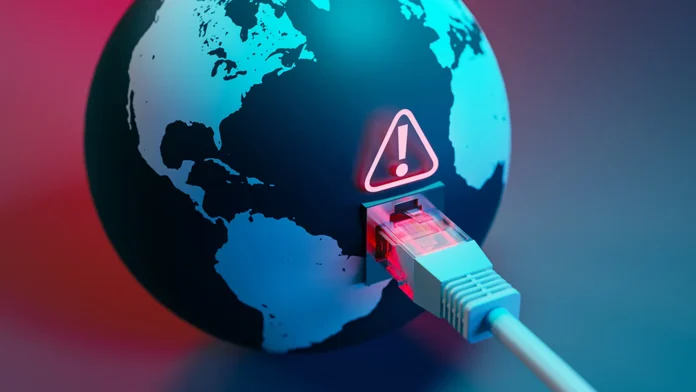
Key Takeaways
- California’s largest state-approved electronic filing platform, eFileCA, has gone offline due to cascading effects from the Amazon Web Services (AWS) outage that began early Monday. The disruption is now preventing law firms, courts, and pro se litigants from submitting or processing documents across multiple judicial e-filing systems, including Odyssey File & Serve.
- The issue began in the early morning hours when AWS reported “increased error rates and latencies” in itsUS-EAST-1 region, which hosts infrastructure critical to many national and state-run digital platforms. Although Amazon stated the problem had been “fully mitigated” by 6:35 a.m. ET, the persistence of outages affecting Odyssey’s e-filing systems hours later suggests that underlying network instability continues to ripple across the judicial technology stack.
- Moments ago, Odyssey File & Serve issued a statewide notice confirming that e-filing support, phone lines, and service portals remain down. “Due to an AWS outage, e-filing support is unavailable,” the notice read. The vendor directed filers to reach support via email rather than the system’s normal interface — a clear indicator of deep infrastructure dependencies tied to AWS’s cloud backbone.
By Samuel A. Lopez | USA Herald | October 20, 2025
SAN JOSE, CA – California’s judicial branch relies heavily on eFileCA, operated through Tyler Technologies’ Odyssey platform, to manage filings for civil, probate, small claims, and criminal divisions across multiple counties. As of Monday morning, Odyssey’s systems are reporting functional outages across its entire network of client interfaces.
The company confirmed that its File & Serve, Guide & File, and re: Search services — key portals used by courts, attorneys, and the public — are all experiencing downtime.
Support teams issued an identical statement across all systems:
“Due to an AWS outage, e-filing support is unavailable. You may contact our teams via email at [email protected], [email protected], or [email protected].”
Adding to the disruption, Odyssey also confirmed that its phone lines are completely inoperative, including its primary Filer Support line (800-297-5377) and re: Search Support line (844-307-8720).
The company’s message closed with a link to its fallback portal — Odyssey File and Serve Cloud (zendesk.com) — for those attempting to reach support manually.
For attorneys and court staff, the timing could not be worse. With many California courts enforcing strict filing deadlines, the outage jeopardizes statutory compliance and case management timelines. Under California Rules of Court 2.259(a)(1), a filing is deemed received upon electronic submission — meaning that if the system is down, litigants may be unable to meet mandatory deadlines unless courts issue blanket extensions or leniency orders.
This creates an immediate risk of procedural prejudice for litigants unaware of the statewide disruption. Legal technology analysts note that California’s court system, one of the nation’s largest, is now confronting a test of its digital resilience. While AWS underpins countless online services, its entanglement with state judicial infrastructure underscores how dependent modern governance has become on private-sector cloud providers.
AWS hosts many of the backend servers that power Odyssey’s cloud applications. Although Amazon initially said the problem was “fully mitigated,” today’s continued fallout shows that restoration at the infrastructure level does not necessarily restore full service to dependent applications.
According to outage tracking platform Downdetector, AWS disruptions have affected major apps like Snapchat, WhatsApp, DoorDash, Ring Cameras, Coinbase, and Netflix — but the ripple effects hitting government and court systems reveal a deeper systemic vulnerability.
At issue is not only reliability but transparency. Amazon’s post-incident update failed to specify the root cause, leaving technologists and government IT officials unable to determine whether the incident was triggered by hardware faults, routing issues, or potential spectrum interference — a subject USA Herald has been closely following since revelations about SpaceX’s Starshield network emitting unauthorized downlinks.
While AWS has publicly ruled out a cyberattack, some experts are raising the possibility of external signal interference affecting communication between cloud servers and regional routing hubs. The question remains: could the same mysterious radio-frequency activity detected from orbit — the so-called “Starshield signals” — be contributing to packet loss or data corruption in cloud systems reliant on satellite synchronization?
It’s speculative, but the timing is striking. Starshield’s allegedly unauthorized transmissions were first exposed by NPR and confirmed by independent satellite trackers. As the federal government remains silent on the network’s purpose, these classified downlinks continue to draw scrutiny for their potential to disrupt other commercial and scientific systems — from astronomical observatories to now, possibly, digital court infrastructure.
If proven, such interference could trigger legal, regulatory, and insurance consequences for both SpaceX and federal contracting agencies, given their obligations under the Communications Act and ITU frequency-allocation treaties.


